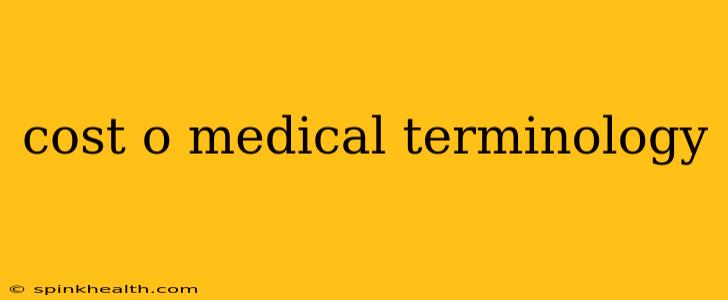The cost of learning medical terminology can vary wildly depending on your learning style, goals, and chosen resources. It's not simply a matter of slapping a price tag on a textbook; it's about investing in a skillset that can significantly impact your career prospects and understanding of the healthcare world. Let's delve into the different avenues and their associated costs, painting a clearer picture of this investment.
What are the Different Ways to Learn Medical Terminology?
Before we dissect the pricing, understanding the learning options is crucial. Many paths lead to medical terminology mastery:
- Self-Study: This often involves purchasing textbooks, workbooks, and online courses. It's the most flexible and potentially cheapest route, but requires significant self-discipline and motivation.
- Formal Classes: Community colleges, vocational schools, and universities offer structured medical terminology courses. These provide a structured learning environment with instructor guidance and interaction with peers.
- Online Courses: Platforms like Coursera, edX, and Udemy offer various medical terminology courses, ranging from free introductory modules to comprehensive paid programs. Prices vary drastically depending on course length and depth of instruction.
- On-the-Job Training: Some healthcare roles offer on-the-job training in medical terminology, though this is often coupled with other skills training and may not be a dedicated program.
How Much Does Each Method Typically Cost?
Let's break down the typical cost ranges for each learning method:
Self-Study:
This can range from $50 to $500+. A single textbook can cost anywhere from $30 to $150, and supplemental workbooks or online resources can add to the expense. The upper limit depends on the number of resources you acquire and the complexity of the materials.
Formal Classes:
Community college courses are usually the most affordable, often costing between $500 and $2,000 per course, depending on the institution and the length of the program. University courses can be significantly more expensive, ranging from $1,000 to $5,000+ per course.
Online Courses:
The cost of online courses is incredibly variable. Free courses offer a great starting point, but comprehensive paid courses can range from $50 to $500+, depending on the platform and the course's length and content.
On-the-Job Training:
This method is essentially free, as the training is incorporated into your employment. However, it may not provide the same depth of knowledge as dedicated courses.
What Factors Influence the Overall Cost?
Several factors can influence the overall cost of your medical terminology education:
- Course Length: Longer, more intensive courses will naturally cost more.
- Course Content: Courses covering specialized areas like surgical terminology or pharmaceutical terminology might command higher fees.
- Instructor Qualifications: The expertise and credentials of the instructor can affect the price.
- Location: Costs can vary significantly depending on geographic location.
- Additional Resources: The cost of supplemental materials like flash cards, dictionaries, or software can add up.
Are There Free or Low-Cost Options Available?
Yes! Many free resources exist to help you learn medical terminology. These include:
- Free Online Courses: Several platforms offer introductory medical terminology courses at no cost.
- Open Educational Resources (OER): Search for open-access textbooks and learning materials online.
- Library Resources: Your local library may have relevant textbooks or online databases available.
- YouTube Tutorials: Many helpful videos explaining medical terms are available on YouTube.
Remember that while free resources are great for getting started, they may not provide the same structured learning and support as paid courses.
Is the Investment Worth It?
The investment in learning medical terminology can significantly enhance your career prospects in numerous healthcare fields. The increased knowledge and understanding can lead to better job opportunities and higher earning potential, ultimately making the initial investment worthwhile. The value of this knowledge extends beyond just career advancement; it empowers individuals to better understand their own healthcare and navigate the medical world with greater confidence.
By carefully considering your learning style, budget, and career aspirations, you can make an informed decision about the most suitable and cost-effective way to learn medical terminology.

